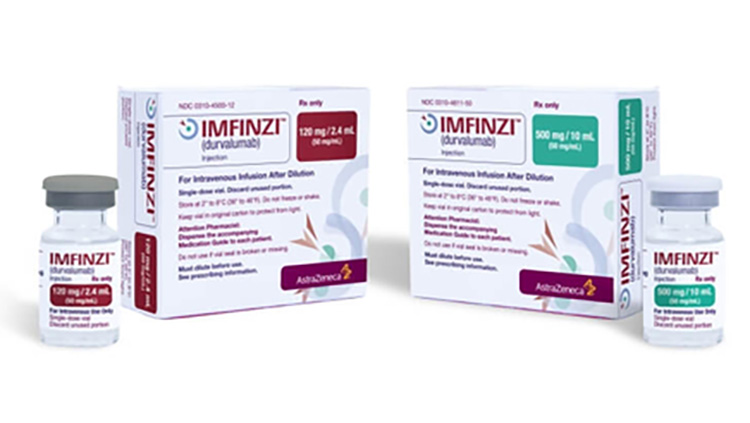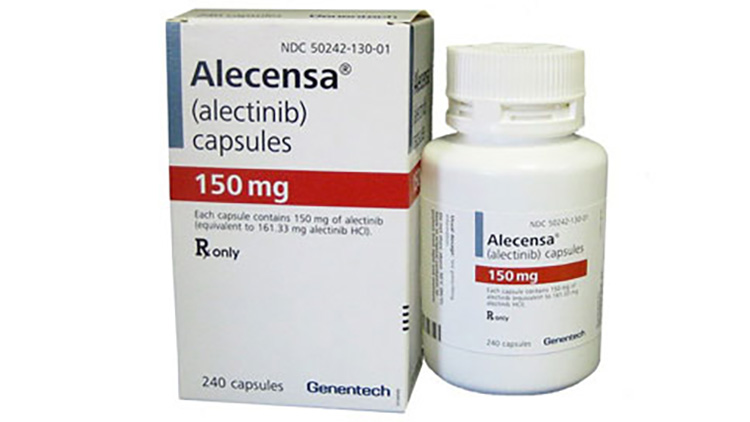Imfinzi (durvalumab) vs Alecensa (alectinib)
Imfinzi (durvalumab) vs Alecensa (alectinib)
Imfinzi (durvalumab) is an immune checkpoint inhibitor specifically targeting the PD-L1 protein, used primarily in the treatment of certain types of urothelial carcinoma and non-small cell lung cancer (NSCLC). Alecensa (alectinib) is a tyrosine kinase inhibitor that targets the ALK protein and is used to treat NSCLC in patients who have ALK mutations. The choice between Imfinzi and Alecensa would depend on the specific genetic markers and characteristics of the patient's cancer, as well as the overall health profile of the patient, which should be thoroughly discussed with an oncologist.
Difference between Imfinzi and Alecensa
| Metric | Imfinzi (durvalumab) | Alecensa (alectinib) |
|---|---|---|
| Generic name | Durvalumab | Alectinib |
| Indications | Urothelial carcinoma, non-small cell lung cancer (NSCLC) | Non-small cell lung cancer (NSCLC), specifically ALK-positive |
| Mechanism of action | PD-L1 inhibitor | ALK inhibitor |
| Brand names | Imfinzi | Alecensa |
| Administrative route | Intravenous infusion | Oral |
| Side effects | Fatigue, musculoskeletal pain, constipation, decreased appetite, nausea, peripheral edema, urinary tract infection, fever, rash | Constipation, fatigue, peripheral edema, myalgia, anemia, elevated liver enzymes, diarrhea, muscle pain, rash |
| Contraindications | Hypersensitivity to durvalumab or any of its excipients | Hypersensitivity to alectinib or any of its excipients, severe hepatic impairment |
| Drug class | Antineoplastic, immune checkpoint inhibitor | Antineoplastic, tyrosine kinase inhibitor |
| Manufacturer | AstraZeneca | Genentech (a member of the Roche Group) |
Efficacy
Imfinzi (Durvalumab) Efficacy in Lung Cancer
Imfinzi (durvalumab) is a programmed death-ligand 1 (PD-L1) blocking antibody used in the treatment of lung cancer, specifically in the management of certain types of non-small cell lung cancer (NSCLC). Clinical trials have demonstrated its efficacy as a maintenance therapy in patients with stage III NSCLC who have not progressed following concurrent platinum-based chemotherapy and radiation therapy. The PACIFIC trial, a pivotal study for durvalumab, showed a significant improvement in median progression-free survival (PFS) compared to placebo. Furthermore, durvalumab treatment has also led to an improvement in overall survival (OS) in this patient population, marking it as a significant advancement in the management of stage III NSCLC.
For patients with advanced NSCLC whose tumors express PD-L1 on 1% or more of tumor cells, durvalumab is indicated as a first-line treatment in combination with etoposide and either carboplatin or cisplatin. The efficacy of durvalumab in this setting is supported by improved survival outcomes and response rates when used as part of a combination regimen, as shown in clinical studies. However, it is important to note that the efficacy of durvalumab can vary based on the level of PD-L1 expression and the presence of specific genetic mutations.
Alecensa (Alectinib) Efficacy in Lung Cancer
Alecensa (alectinib) is a tyrosine kinase inhibitor specifically designed to target the anaplastic lymphoma kinase (ALK) fusion gene, which is a driver of oncogenesis in a subset of NSCLC patients. Alectinib has demonstrated high efficacy in patients with ALK-positive NSCLC, both in the first-line setting and after progression on crizotinib, which was the first ALK inhibitor approved for this indication. In clinical trials, alectinib has shown a prolonged PFS compared to crizotinib, with the ALEX trial being a landmark study that established alectinib as a preferred first-line treatment for ALK-positive NSCLC patients.
Moreover, alectinib has a notable ability to penetrate the central nervous system (CNS), which is particularly important as the brain is a common site of metastasis for ALK-positive NSCLC. Clinical data have shown that alectinib significantly reduces the risk of CNS progression and is associated with high rates of CNS response in patients with brain metastases. The efficacy of alectinib in controlling disease both systemically and in the CNS makes it a critical option for patients with ALK-positive NSCLC, potentially altering the course of the disease and improving patient outcomes.
Regulatory Agency Approvals
Imfinzi
-
European Medical Agency (EMA), European Union

-
Food and Drug Administration (FDA), USA

-
Health Canada

-
Therapeutic Goods Administration (TGA), Australia

-
Medsafe (NZ)

Alecensa
-
European Medical Agency (EMA), European Union

-
Food and Drug Administration (FDA), USA

-
Health Canada

-
Pharmaceuticals and Medical Devices Agency (PMDA), Japan

-
Therapeutic Goods Administration (TGA), Australia

-
Medsafe (NZ)

Access Imfinzi or Alecensa today
If Imfinzi or Alecensa are not approved or available in your country (e.g. due to supply issues), you can access them via Everyone.org.
How it works

Make an enquiry
Choose the medicine you want to buy, answer a couple of questions, and upload your prescription to speed things up. We’ll get back to you within 24 hours.


Make an enquiry
Choose the medicine you want to buy, answer a couple of questions, and upload your prescription to speed things up. We’ll get back to you within 24 hours.


Breeze through the paperwork
We'll guide you through the required documents for importing unapproved medicine, ensuring you have all the necessary information.


Get a personalized quote
We’ll prepare a quote for you, including medicine costs and any shipping, administrative, or import fees that may apply.


Receive your medicine
Accept the quote and we’ll handle the rest - sourcing and safely delivering your medicine.

Some text on this page has been automatically generated. Speak to your physician before you start a new treatment or medication.
Let's talk
If you have any questions, call us or send us a message through WhatsApp or email:
Contact us




